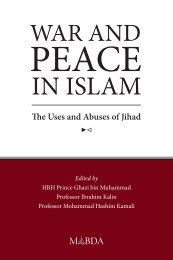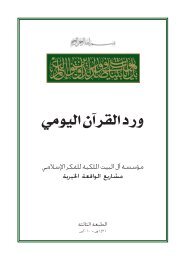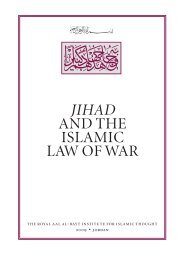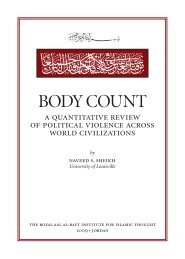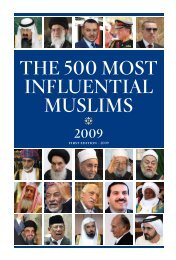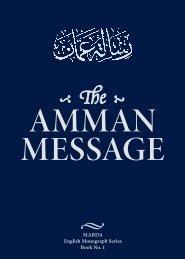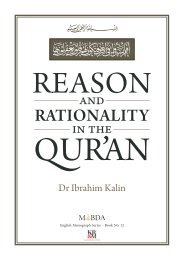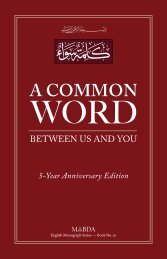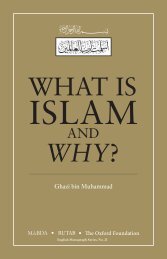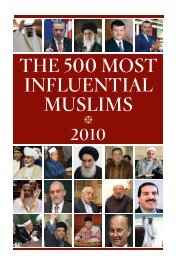Al-W¥^idÏ's Asb¥b al-Nuz‰l - The Royal Islamic Strategic Studies ...
Al-W¥^idÏ's Asb¥b al-Nuz‰l - The Royal Islamic Strategic Studies ...
Al-W¥^idÏ's Asb¥b al-Nuz‰l - The Royal Islamic Strategic Studies ...
Create successful ePaper yourself
Turn your PDF publications into a flip-book with our unique Google optimized e-Paper software.
Chapter 8: Surah <strong>al</strong>-Anf<strong>al</strong><br />
(O ye who believe! Betray not <strong>Al</strong>lah and His messenger…) [8:27].<br />
This verse was reve<strong>al</strong>ed about Abu Lubabah ibn ‘Abd <strong>al</strong>-Mundhir <strong>al</strong>-Ansari. 8 What happened is that the<br />
Messenger of <strong>Al</strong>lah, <strong>Al</strong>lah bless him and give him peace, besieged the Jews of Banu Qurayzah for 21<br />
nights when they requested peace from the Messenger of <strong>Al</strong>lah, <strong>Al</strong>lah bless him and give him peace, on<br />
the same terms that their brothers from Banu’l-Nadir had secured before, i.e. that they join their brothers<br />
in Adhri‘at and Jericho in Syria. But he refused to grant it to them and insisted that they submit to<br />
the judgment of Sa‘d ibn Mu‘adh. <strong>The</strong>y refused to do so and said: “Send us Abu Lubabah, instead”. Abu<br />
Lubabah was loy<strong>al</strong> to them, for his property, wife and children were with them. When the Messenger of<br />
<strong>Al</strong>lah, <strong>Al</strong>lah bless him and give him peace, sent him to them, they said to him: “O Abu Lubabah, what<br />
do you think we should do Should we accept the judgment of Sa‘d ibn Mu‘adh” Abu Lubabah made<br />
a gesture to his throat, i.e. that they should not do it, for they will be slaughtered. Abu Lubabah said: “I<br />
straightaway re<strong>al</strong>ised that I had betrayed <strong>Al</strong>lah and His Messenger”. And then this verse was reve<strong>al</strong>ed<br />
about him. When the verse was reve<strong>al</strong>ed, Abu Lubabah tied himself to one of the columns of the mosques<br />
and said: “By <strong>Al</strong>lah, I will not taste food or drink until <strong>Al</strong>lah relents on me or I die”. He remained in this<br />
state for seven days, neither eating nor drinking, until <strong>Al</strong>lah, ex<strong>al</strong>ted is He, relented on him. When it<br />
was said to him: “O Abu Lubabah! You have been pardoned”, he said: “By <strong>Al</strong>lah, I will not untie myself;<br />
I want the Messenger of <strong>Al</strong>lah, <strong>Al</strong>lah bless him and give him peace, to untie me”. <strong>The</strong> Prophet went and<br />
untied him with his own hands. Abu Lubabah then said: “<strong>The</strong> completion of my repentance requires that<br />
I migrate from the abode of my people where I had committed the sin and that I let go of my property”.<br />
<strong>The</strong> Messenger of <strong>Al</strong>lah, <strong>Al</strong>lah bless him and give him peace, said to him: “It is enough that you give a<br />
third of it to charity”. 9<br />
(And when they said: O <strong>Al</strong>lah! If this be indeed the truth from <strong>The</strong>e…) [8:32-33].<br />
<strong>The</strong> Commentators of the Qur’an said: “This was reve<strong>al</strong>ed about <strong>al</strong>-Nadr ibn <strong>al</strong>-Harith who said: ‘[O <strong>Al</strong>lah!]<br />
If what Muhammad says is true, then rain down stones on us’ ”. 10<br />
Muhammad ibn Ahmad ibn Ja‘far informed us> Muhammad ibn ‘Abd <strong>Al</strong>lah ibn Muhammad ibn <strong>al</strong>-<br />
Hakam> Muhammad ibn Ya‘qub <strong>al</strong>-Shaybani> Ahmad ibn <strong>al</strong>-Nadr ibn ‘Abd <strong>al</strong>-Wahhab> ‘Ubayd <strong>Al</strong>lah<br />
ibn Mu‘adh> his father> Shu‘bah> ‘Abd <strong>al</strong>-Hamid, the companion of <strong>al</strong>-Ziyadi who heard Anas ibn<br />
M<strong>al</strong>ik saying: “Abu Jahl said: (If this be indeed the truth from <strong>The</strong>e, then rain down stones on us or bring<br />
on us some painful doom!) and so this was reve<strong>al</strong>ed (But <strong>Al</strong>lah would not punish them while thou wast<br />
with them)”. 11 This was narrated by Bukhari from Ahmad ibn <strong>al</strong>-Nadr and by Muslim from ‘Abd <strong>Al</strong>lah<br />
ibn Mu‘adh.<br />
(And their worship at the (holy) House is naught but whistling and hand-clapping…) [8:35].<br />
Abu Isma‘il ibn ‘Amr <strong>al</strong>-Naysaburi informed us> Hamzah ibn Shabib <strong>al</strong>-Ma‘mari> ‘Ubayd <strong>Al</strong>lah ibn<br />
Ibrahim ibn B<strong>al</strong>awayh> Abu’l-Muthanna Mu‘adh ibn <strong>al</strong>-Muthanna> ‘Amr>> his father> Qurrah> ‘Atiyyah><br />
Ibn ‘Umar who said: “<strong>The</strong>y [people in the pre-<strong>Islamic</strong> period] used to go round the Ka‘bah clapping<br />
— and he described how they clapped — and whistling — and he described how they whistled<br />
— and they <strong>al</strong>so put their cheeks on the ground. <strong>The</strong>n this verse was reve<strong>al</strong>ed”. 12<br />
8<br />
Durr, :48; Tabari, :221.<br />
9<br />
Musnad of Ahmad.<br />
10<br />
Durr, :55; Tabari, :232.<br />
11<br />
Durr, :55.<br />
12<br />
Durr, :61-62; Tabari, :241.<br />
115



